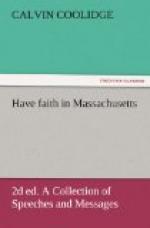[After Senator Lodge spoke he introduced President Lowell:]
The next to address you is the President of Harvard University—an educator renowned throughout the world, a learned student of statesmanship, endowed with a wisdom which has made him a leader of men, truly a Master of Arts, eminently a Doctor of Laws, a fitting representative of the Massachusetts domain of letters—Abbott Lawrence Lowell.
XXVIII
VETO OF SALARY INCREASE
TO THE HONORABLE SENATE AND HOUSE OF REPRESENTATIVES:
In accordance with the duty imposed by the Constitution, a bill entitled, “An act to establish the compensation of the members of the General Court,” being House No. 1629, is herewith returned without approval.
This bill raises the salaries of members from $1000 to $1500, an increase of fifty per cent, and is retroactive. It is necessary to decide whether the Commonwealth can well afford this additional tax and whether any public benefit would accrue from it.
These are times that require careful scrutiny of public expenditure. The burden of taxes resulting from war is heavy. The addition of $142,000 to the expense of the Commonwealth in perpetuity is not to be undertaken but upon proven necessity.
Service in the General Court is not obligatory but optional. It is not to be undertaken as a profession or a means of livelihood. It is a voluntary public service. In accord with the principles of our democratic institutions a compensation has been given in order that talent for service rather than the possession of property might be the standard of membership. There is no man of sufficient talent in the Commonwealth so poor that he cannot serve for a session, which averages about five months, and five days each week, at a salary of $1000—and travel allowance of $2.50 for each mile between his home and the State House. This is too clear for argument. There is no need to consider those who are too rich to serve for this sum. It would be futile to discuss whether their services are worth more or less than this, as that is not here the question. Membership in the General Court is not a job. There are services rendered to the Commonwealth by senators and representatives that are priceless. For the searching out of great principles on which legislation is based there is no adequate compensation. If value for services were the criterion, there would be 280 different salaries. When membership is sought as a means of livelihood, legislation will pass from a public function to a private enterprise. Men do not serve here for pay. They seek work and places of responsibility and find in that seeking, not in their pay, their honor.




